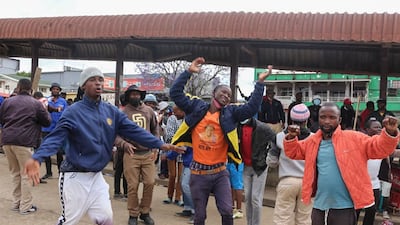A ban on protests silenced Eswatini's pro-democracy movement on Friday, as regional mediators sought to resolve the deadly unrest in the kingdom.
Formerly known as Swaziland, Africa's last absolute monarchy has been rocked by demonstrations that prompted authorities to deploy the army and throttle the internet.
At least two people were killed and dozens injured in clashes with security forces, who fired tear gas, live rounds and rubber bullets to disperse crowds.
Mediators from the 16-nation Southern African Development Community met King Mswati III on Thursday.
"Images that are coming from Eswatini are very disturbing indeed, and we can see that the political temperature is very hot," Jeff Radebe, the head of the mediation team, told South Africa's public broadcaster.
Mr Radebe said the kingdom's "issues are very complex", and the team was "going there with an open mind, ensuring that we hear all views, so that at the end of the day the people of Eswatini... come up with a lasting solution".
After the government stopped issuing protest permits, shops reopened on Friday in the main cities of Mbabane and Manzini, with residents walking on the streets peacefully.
The government also restored internet links, two days after it had cut off most access.
But schools remained closed, and a strike by nurses entered its second day. The nurses are refusing to treat security officials after they stormed the largest government hospital in Mbabane.
The nurses' union accused security forces of shooting at staff tending to the injured and travelling to work for night shifts.
The government has dismissed reports of heavy-handed interventions as "unfounded".
We "have reports of injuries which we are still collating but no death," government secretary Sabelo Dlamini said.
He said security forces had been deployed to prevent damage to "lives and property" and protect citizens from "unruly protestors and anarchists".
Violent anti-monarchy protests erupted in June, fuelled by discontent over living conditions and lack of political freedom in the tiny southern African kingdom.
Anger was directed at King Mswati III, who flaunts a luxury lifestyle in one of the world's poorest countries.
The latest flare-up in demonstrations has run for more than two weeks, spearheaded by students, civil servants and transport workers.
At least 30 people have died since June in some of the worst unrest in Eswatini's history.
More protests, this time led by textile workers, are planned for Monday.












